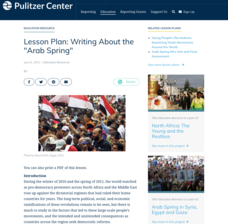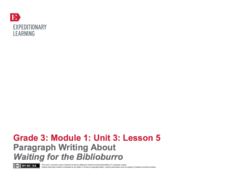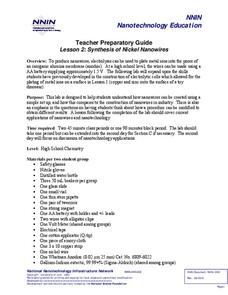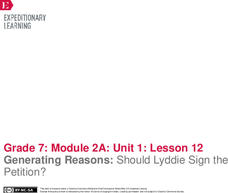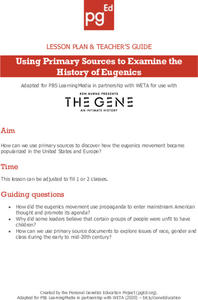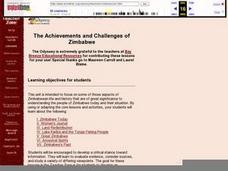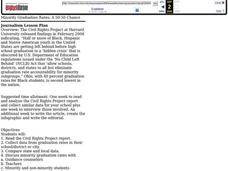Pulitzer Center
Writing About the "Arab Spring"
An information-rich resource, this webpage will provide your class with all the information they need to explore a relevant real-world and little understood topic: the Middle East and the people's revolutions that shook it in the spring...
ARKive
Galapagos Conservation
The Galapagos Islands inspired Darwin to develop his theory of evolution. These wonderful islands will also be the topic of a lesson on habitat and conservation. In small groups, learners will collect and synthesize information regarding...
EngageNY
Paragraph Writing About Waiting for the Biblioburro
Ask your learners to synthesize what they know about Waiting for the Biblioburro by writing a well-organized paragraph. Young writers focus on using transition words and including specific details in their paragraphs. The plan allows for...
Curated OER
Dos mapas de Florida, el Caribe y parte de Sur America
What can maps tell us about the past? Find out with a Spanish lesson plan that incorporates geography. After examining maps individually, comparing two old maps of Spanish Florida and writing notes in the provided Venn diagram, pupils...
EngageNY
Grade 9 ELA Module 2, Unit 3, Lesson 12
As the first in a two-part, end-of-unit assessment that encourages readers to synthesize the unit's main ideas, class members review their notes for each of the three texts they read and develop three open-ended discussion questions...
EngageNY
Grade 9 ELA Module 3, Unit 2, Lesson 12
Ninth graders synthesize their inquiry paths, research process, and claim formulation with a writing assessment at the end of the unit. Learners write a one-page perspective about their conclusions from the research process and outcomes...
C-SPAN
Presidential Birth Requirement
Every president of the United States must be a natural-born citizen, but the definition of natural-born is not as straightforward as it seems. Secondary scholars examine two points of view surrounding the constitutional requirement and...
Library of Virginia
An Overview of American Slavery
The final lesson in a unit study of American slavery asks young historians to synthesize what they have learned about how slavery in America changed over time. Revisiting the many documents they have examined, they consider the economic,...
K20 LEARN
The Parched Plains: Weather And Climate
How do meteorologists differentiate between droughts and dry spells? Introduce the concepts of weather forecasting and prediction with an insightful research-based lesson from the K20 series. Partners synthesize individual research from...
National Nanotechnology Infrastructure Network
Synthesis of Nickel Nanowires
It's all about the scale—they're not just wires, they're nanowires! The second lesson of the series builds on the oxidation-reduction experiment in the first lesson. Scholars synthesize a sample of nanowires using electrolysis. As they...
American Statistical Association
What Fits?
The bounce of a golf ball changes the result in golf, mini golf—and a great math activity. Scholars graph the height of golf ball bounces before finding a line of best fit. They analyze their own data and the results of others to better...
Equality and Human Rights Commission
Discrimination
Discrimination takes many forms, and lesson eight in the 12-part series addresses many types and their greater impact on society. The lesson uses a presentation, videos, news stories, and discussions to synthesize many different viewpoints.
EngageNY
Generating Reasons: Should Lyddie Sign the Petition?
Scholars synthesize evidence from Katherine Paterson's Lyddie to create a list of the pros and cons of Lyddie signing a petition about working conditions. They use the Lyddie's Decision anchor chart to record their thoughts and ideas...
EngageNY
Analyzing the Features of an Informative Consumer Guide
Analyze, strategize, synthesize! Scholars analyze informative consumer guides to determine what features to include in their own guides. Next, pupils select charts and images to use in their guides.
EngageNY
Science Talk
Talk like a scientist. Pupils engage in a science talk about rainforests, using a note-catcher worksheet to record important points. Next, they work in triads to synthesize their ideas about the rainforest, adding notes to a KWL anchor...
EngageNY
Research: Close Read of Text 2 for Each Expert Group
Pass the chalk! Pupils participate in a Chalk Talk activity to synthesize information from multiple texts about Roberto Clemente and Althea Gibson. Scholars also read an informational article about one of the athletes, searching for...
Personal Genetics Education Project
Using Primary Sources to Examine the History of Eugenics
Eugenics philosophy takes survival of the fittest to a whole new level. With a research-focused lesson, young scientists examine the history of the eugenics movement and its impact on society. Pupils engage with a video clip, primary...
Center for History Education
To What Extent Were Women's Contributions to World War II Industries Valued?
Women rose to the challenge when the nation's war effort called them—but were sent home when the GIs came back from World War II. Young historians consider whether the United States valued women's contributions during the war using a...
Curated OER
The Achievements and Challenges of Zimbabwe
Here is an excellent set of five short lessons and activities intended to help learners not only gain an understand of current issues in Africa, but build critical thinking, synthesis, analysis, expository writing, research, and...
Curated OER
Prom king...or not?
Students conduct research on issues and interests by generating ideas and questions and by posing problems. They gather, evaluate and synthesize data from a variety of sources (e.g., print and non-print texts, artifacts, people) to...
Curated OER
Parts of a Cell Analogy
Learners reinforce comprehension of the parts of a cell. Theyl synthesize this content knowledge in a descriptive paragraph writing assignment.
Curated OER
Are You Sure You've Got the Right Answer?
Young researchers work through the research cycle. They question, plan, gather, sort, synthesize, and evaluate the materials they collect at the library. There are web supplements for this lesson.
Curated OER
Minority Graduation Rates: A 50-50 Chance
Students conduct research on issues and interests by generating ideas and questions and by posing problems. They gather, evaluate and synthesize data from a variety of sources. In this lesson the issue is minority graduation rates.
Curated OER
Presidential endorsements: Newspapers decide
Twelfth graders collect, organize, evaluate and synthesize information from multiple sources in order to draw logical conclusions. They communicate this information using appropriate social studies terminology in oral, written or...
Other popular searches
- Synthesize Reading Strategy
- Synthesize Information
- Synthesize Graphic Organizer
- Reading Synthesize
- Synthesize Reading Passages
- Synthesize Lesson Plan
- Comprehension Synthesize
- Synthesize Text
- Synthesize and Reading
- Music Synthesizers
- Synthesize Materials
- Synthesized Music


